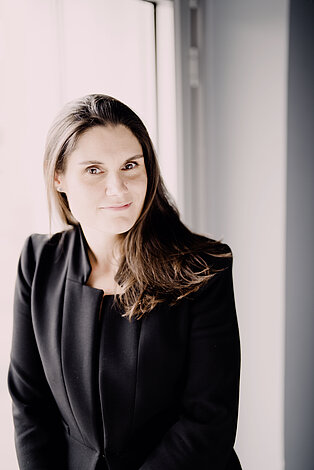With Abravanel Hall’s future in question, Lazarova leads a high-voltage Utah Symphony concert
The Utah Symphony returned to Abravanel Hall Friday night for the first concerts since the public learned of an existential threat to the hall, and the orchestra could hardly have planned its homecoming any better.
Salt Lake County Mayor Jenny Wilson announced Tuesday that she prefers to keep the hall “in its present form” after an earlier statement indicated it might be demolished and rebuilt as part of new NHL owner Ryan Smith’s proposed downtown sports and entertainment district.
Before the concert, young people in the lobby distributed gold ribbon pins and “Save Abravanel Hall” badges, Afterward, Carolyn Abravanel, widow of the hall’s namesake, urged the throng who gathered for the ceremonial lighting of brand-new signage to keep pressuring Salt Lake City and Salt Lake County officials to preserve the auditorium.
In between, a near-capacity audience heard conductor Delyana Lazarova lead supercharged performances of one proven crowd-pleaser, one slightly lesser-known masterpiece, and one charming new work.
The curtain-raiser was Dobrinka Tabakova’s Orpheus’ Comet, a surprisingly upbeat six-minute take on the ever-popular legend. The work is dominated by a relentless buzzing figure in the brass—bees feature prominently in an early telling by Virgil—that eventually swarms through the full orchestra. Lazarova kept the energy at full boil, with occasional string interludes allowing listeners to pause, catch their breaths and contemplate the night sky.
Former Bountiful resident Wendy Bryn Harmer, who wowed Utah Opera audiences in The Flying Dutchman last season, returned to Salt Lake City to sing Ravel’s song cycle Shéhérazade.
Harmer’s performance Friday was every bit as stunning as her Senta. A renowned interpreter of Wagner might not seem like a logical choice for this repertoire, but Harmer’s lustrous soprano proved well-suited to Ravel’s impressionistic song-cycle. She skillfully evoked a wide range of moods: dreamy, fanciful, yearning, impassioned.
The projected titles felt a bit superfluous, especially in the first movement—both because the travelogue is peppered with old-fashioned stereotypes and because Harmer and the orchestra painted such a vivid picture on their own. Flutist Mercedes Smith, oboist Zachary Hammond and harpist Louise Vickerman, in particular, made Ravel’s exquisite orchestration glitter.
After intermission came Rimsky-Korsakov’s Scheherazade, a blockbuster showpiece for the entire orchestra. Under Lazarova’s direction, the turbulent ocean scenes felt terrifyingly real and the romantic tales of princes and princesses were spellbinding. There were a couple of moments when the conductor created the uniquely thrilling sensation that chaos was about to erupt—if not for the splendid articulation of the strings assuring the audience that the situation was under control.
Concertmaster Madeline Adkins did stellar work with the beguiling storyteller violin theme that ties the suite together, but several of her colleagues also delivered world-class solo turns, from Hammond, Smith and Vickerman to clarinetist Tad Calcara, bassoonist Lori Wike and the entire trombone section.
So stunning was Hammond and Wike’s work in the second movement, in fact, that some patrons sprang from their seats in an apparently spontaneous mid-performance standing ovation. But there was much more to come, and whether out of appreciation for the generous music-making, love for the venue itself, or a combination of the two, the audience reacted with one of the longest, noisiest Abravanel Hall ovations in recent memory.
The program will be repeated 5:30 p.m. Saturday. utahsymphony.org
